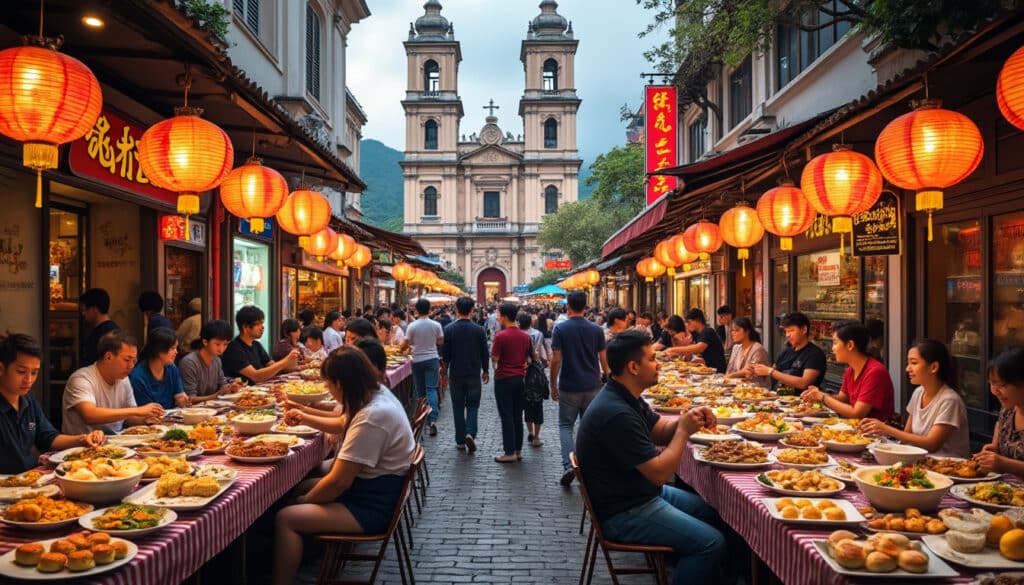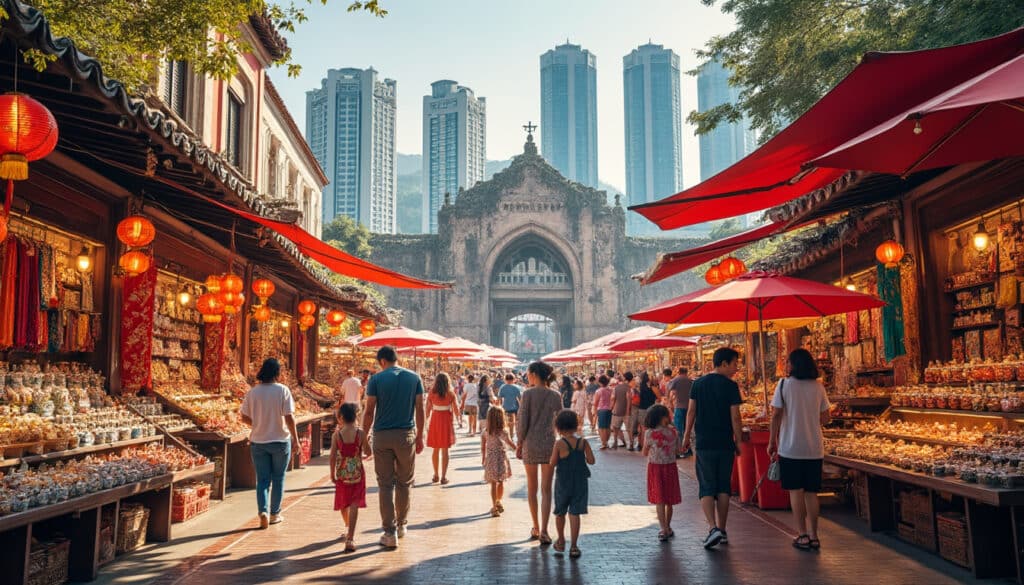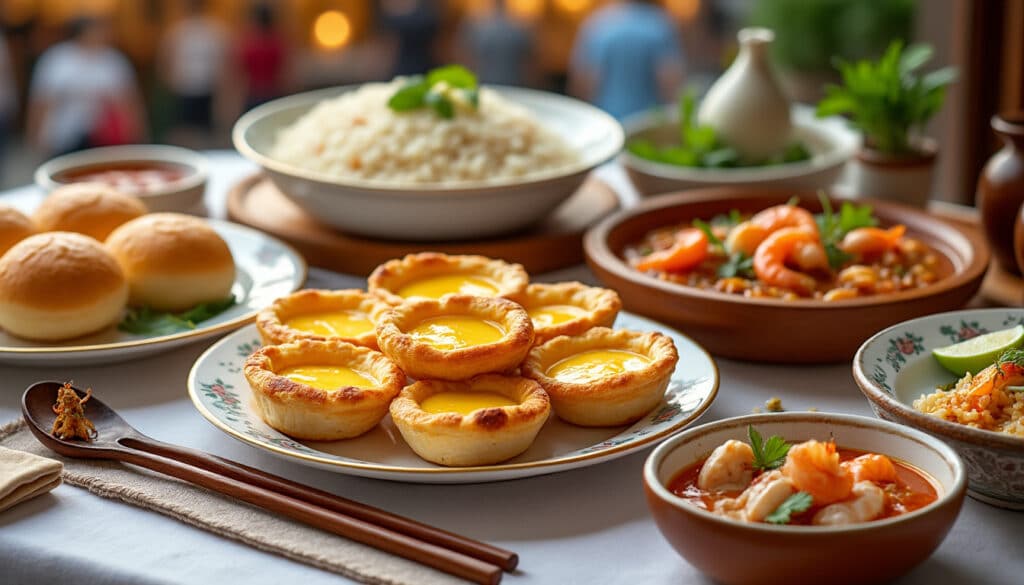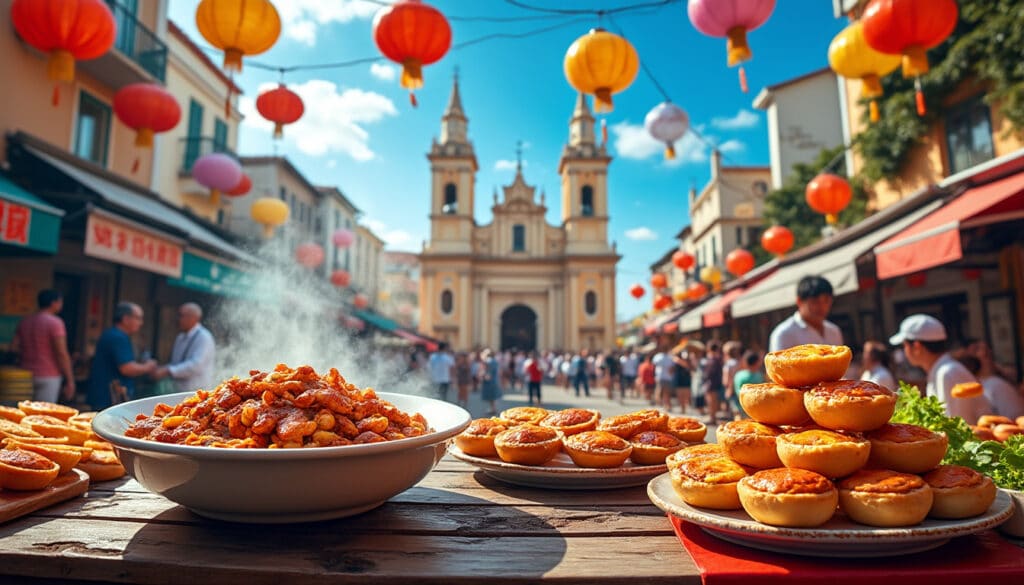Macau, an enchanting blend of East and West, is a vibrant city on the southern coast of China, renowned for its multicultural heritage and pulsating energy. As a former Portuguese colony and now a Special Administrative Region (SAR) of China, Macau’s linguistic tapestry is as intricate and rich as its history. Tourists flock to this global gambling hub not only for its luxurious resorts and casinos but also to witness the fascinating coexistence of various languages. Cantonese, Mandarin, Portuguese, and English create a symphony of languages that resonate throughout its bustling streets and historical landmarks. Dive into the linguistic landscape of Macau and uncover how these languages contribute to its unique identity and dynamic culture.
The Predominance of Cantonese in Macau
One cannot explore the linguistic terrain of Macau without encountering the dominance of Cantonese. This language, spoken by approximately 88.7% of the population, serves as the daily communication tool for most Macanese residents. Cantonese’s roots in Guangdong Province make it a natural fit for Macau, connecting the city closely with its geographical neighbors. As a tonal language, Cantonese uses distinct pitch variations to express different meanings, a feature that enhances its lyrical quality and complexity.
In Macau, Cantonese is not only a language but a cultural cornerstone, evident in everything from local cuisine to traditional celebrations. Its prevalence in business negotiations, public broadcasts, and government affairs underscores its integral role in daily life. Furthermore, Cantonese underpins the city’s entertainment scene, with local television dramas, music, and films often produced in this language. This cultural reinforcement ensures that Cantonese remains a vibrant presence in Macau.
While some may find learning Cantonese daunting due to its tonal nature, understanding a few key phrases can be incredibly rewarding. Simple expressions like “nei dim a?” for “how are you?” or “dor jeh” for “thank you” can enrich a visitor’s experience, providing authentic interactions with locals.

Despite the linguistic diversity in Macau, Cantonese acts as a unifying language, bringing together the various ethnic groups living in the city. This is particularly evident during festivals such as the Lunar New Year, where the sharing of language and culture fosters community spirit. The ability to speak Cantonese in Macau not only enriches personal experiences but also offers deeper insights into the heart of Macanese culture.
The Evolution of Mandarin’s Role in Macau
With its rise in global prominence, Mandarin has gradually woven itself into the fabric of Macau’s linguistic landscape. Though Cantonese reigns supreme, Mandarin is spoken by about 5.3% of the population, reflecting the growing influence of mainland China. As the official language of China, Mandarin’s presence in Macau is supported by an increasing number of visitors and immigrants from the mainland, augmenting its role in business, education, and tourism.
In Macau, Mandarin is often used in formal settings and by younger generations seeking to bolster their career prospects. The ability to speak Mandarin offers significant advantages in the job market, particularly in sectors like finance, hospitality, and governmental affairs, where communication with mainland Chinese counterparts is frequent.
- 📚 Increasing interest in learning Mandarin is evident in Macau’s education sector.
- 🔗 Mandarin serves as a bridge between Macau and the broader Chinese economic landscape.
- 🌐 Fluency in Mandarin can open doors to international opportunities.
Efforts to incorporate Mandarin more extensively have not overshadowed the cultural significance of Cantonese. Instead, they represent an acknowledgment of Macau’s evolving identity within the context of modern China. For travelers seeking to embrace Macau fully, learning a blend of Cantonese and Mandarin phrases provides a comprehensive understanding of the region’s linguistic duality.
Portuguese: A Lingering Colonial Legacy
As visitors wander through the cobblestone streets of Macau, the remnants of its Portuguese past are hard to miss, with ornate churches and colonial architecture adorning the cityscape. Portuguese, spoken by around 2.3% of the population, continues to be an official language of Macau, serving as a testament to more than four centuries of colonial history.
Portuguese’s role in Macau is multifaceted. It remains a key language in the legal system, appearing in official documents, court proceedings, and legislative texts. Educational institutions in Macau often provide Portuguese language courses, allowing students to explore the historical and cultural ties between Portugal and Macau.
For the older generation, Portuguese holds a nostalgic charm, representing a period of global exchanges and cultural merges. Today, it is celebrated in cultural events and festivals, such as Lusofonia Festival, which showcases the music, dance, and culinary traditions of Portuguese-speaking countries.
While its everyday use has waned in favor of Chinese languages, Portuguese’s presence still enriches Macau’s cultural identity. Visitors to the region can admire the dual-language street signs and learn about the nuanced influence that Portuguese culture imparts on Macau’s modern society. Whether dining at a traditional Portuguese restaurant or exploring historical landmarks, the echoes of Portuguese continue to be a cherished aspect of Macau’s identity.
The Growing Influence of English
English, widely regarded as an international lingua franca, plays a crucial role in Macau, especially in sectors driven by globalization, such as tourism and business. With 2.8% of the population speaking English, it is not uncommon to see English menus, signs, and public announcements designed to accommodate international travelers.
- 🌍 English enhances Macau’s appeal as a global tourism hub.
- 🛍️ English is prevalent in retail and hospitality, easing the shopping experience for non-Chinese speakers.
- 📈 Proficiency in English offers competitive advantages in Macau’s job market.
English not only facilitates communication between diverse groups within Macau but also strengthens the city’s connections on a global scale. The presence of international schools and businesses ensures a continued emphasis on English language learning. For those looking to navigate Macau successfully, knowing English can make exploration more accessible and interactions with global visitors more meaningful.
In harnessing the power of English, Macau continues to position itself as a cosmopolitan city that bridges East and West. As Macau evolves, the role of English will likely expand, further intertwining with the city’s existing linguistic framework.
The Unique Heritage of Macanese Patuá and Other Languages
The vibrant cultural mosaic of Macau extends beyond the major languages to include Macanese Patuá, a creole born from the blending of Portuguese and Southeast Asian languages. Although considered endangered, this unique dialect embodies the multicultural exchanges that define Macau’s past.
In recent years, efforts to preserve Macanese Patuá have gained momentum, with cultural organizations promoting its study and integration into theatrical performances and literature. These initiatives not only protect the dialect but also celebrate its historical significance, serving as a poignant reminder of Macau’s cultural amalgamation.
Apart from Patuá, other languages enrich Macau’s linguistic diversity. Tagalog, Vietnamese, French, Spanish, Thai, and others, spoken by expatriate communities, create a rich tapestry reflecting the city’s international flavor.
| Language | Primary Use | Community |
|---|---|---|
| Tagalog | Domestic settings | Filipino expatriates |
| Spanish | Educational | Latin American communities |
| French | Diplomatic | French nationals |
| Thai | Hospitality | Thai workers |
Embracing these languages, Macau stands as a testament to harmonious coexistence, reflecting its role as a global confluence of cultures. Whether through culinary exploration, participation in cultural festivals, or engaging with local communities, the diverse languages of Macau offer endless opportunities to experience its unique spirit.
Understanding Macau’s Linguistic Identity: FAQ
-
What is the most widely spoken language in Macau?
Cantonese is the most widely spoken language, used by a substantial majority of the population. It’s central to daily interactions and cultural expressions in Macau.
-
Is Portuguese still relevant in Macau?
Yes, Portuguese remains relevant, especially in legal and educational contexts, and is celebrated through cultural events and historical preservation efforts.
-
Can visitors get by with English in Macau?
English is widely spoken in tourism sectors. Visitors will find it relatively easy to communicate in places like hotels, casinos, and restaurants.
-
What is Macanese Patuá?
Macanese Patuá is a creole language originating from Portuguese and Asian languages, reflecting Macau’s diverse cultural heritage.
-
Are there language-learning resources available in Macau?
Yes, there are various language schools and online platforms where individuals can learn popular languages spoken in Macau, including Mandarin and Portuguese.

Macau, a vibrant and diverse destination, stands as a unique blend of cultures and traditions. As one of Asia’s most dynamic regions, Macau offers an exquisite tapestry of Portuguese and Chinese influences that reflect its rich history. From bustling festivals…

🌟 Macau, a vibrant blend of Portuguese and Chinese influences, offers an unparalleled culinary experience. From street food vendors to exquisite fine dining, the city is a bonanza for food lovers around the world. Whether it’s indulging in the rich…

The vibrant streets of Macau come alive not only with the sounds of bustling casinos and awe-inspiring architecture but also with the enchanting aroma of its unique culinary offerings. As a confluence of cultures, particularly Portuguese and Chinese, Macanese cuisine…

Souvenirs and shopping in Macau
Macau is a vibrant blend of Eastern and Western cultures, manifesting in its architecture, cuisine, and dynamic shopping ecosystem. As a shoppers’ paradise, Macau offers everything from luxury goods to unique souvenirs, thanks to its free port status. This small…



